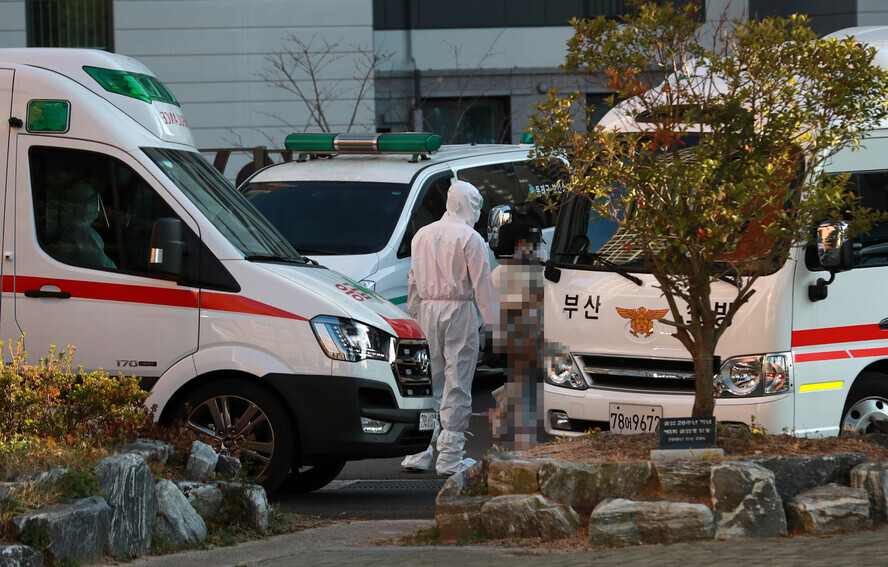hankyoreh
Links to other country sites 다른 나라 사이트 링크
S. Korea anticipates daily COVID-19 caseload shooting up to 700-1,000 in next 2 weeks

The South Korean government anticipates that the country’s daily caseload of COVID-19 could rise to the range of 700 to 1,000 in the next two weeks. While the recent spike had been mostly contained to the Seoul Capital Area (SCA), infections are now spreading to other regions, provoking Busan and other local governments to upgrade to Level 2 social distancing measures as of Dec. 1.
In a regular briefing on Nov. 30, Korea Disease Control and Prevention Agency (KDCA) Director Jung Eun-kyeong explained that the reproduction number for infections over the week from Nov. 22 to 28 stood at 1.43.
“In this case, a simple calculation as to how many infections arise within one to two weeks indicated that there could be as many as 700 to 1,000,” she explained.
The basic reproduction number (R0, pronounced “R naught”) represents the number of people to whom any infected individual can transmit the disease.
“Unless we can keep the number under one, this outbreak will keep growing in size,” Jung said.
There are three factors affecting the replacement number: the likelihood of individuals getting infected, the amount of interpersonal contact, and the length of exposure to other people.
“There are three key elements to bringing the reproduction number below one: personal hygiene, such as wearing masks and washing hands; social distancing, which can reduce contact with others; and early testing, to reduce exposure time,” Jung stressed.
On Monday, South Korea reported 438 new cases of COVID-19, the second consecutive day where the caseload was above 400. An infection cluster at a college of music in the city of Gyeongsan, North Gyeongsang Province, spread to a local high school, bringing the cluster up to 25 as of noon on Monday.
The number of cases linked to a seminar in Jinju, South Gyeongsang Province, rose to 72, while cases linked to an adult karaoke bar in the Masanhoewon District of Changwon increased to 40.
A Kia Motors facility in Gwangju reported four cases, while a Samsung Electronics facility in the same city reported two cases. The workers tested positive after meeting with friends and hanging out at a pool hall.
South Korea’s Central Disaster and Safety Countermeasure Headquarters announced on Sunday that Busan would be elevating its social distancing measures to Level 2 and implementing some disease control measures from Level 3 on Tuesday. That measure will shut down five types of nightlife establishments, including nightclubs and adult karaoke bars, in Busan.
In the Busan region alone, 117 cases have been reported in connection with drum lessons at the Choyeon Music Academy. Cases continue to accumulate as people infected at the academy transmitted the virus to a fitness center and nursing home, from which it spread to a school.
Over the past week, 163 cases have been identified in Busan, and 20 patients were transferred to Keimyung University Dongsan Hospital on Monday.
“Busan Medical Center is currently adding more beds to its quarantine ward, and we’re planning to open a residential treatment center on Dec. 2 to be operated jointly with South Gyeongsang Province. As of Dec. 2, we’ll be able to house all [patients],” a Busan official said.
By Suh Hye-mi, staff reporter, and Kim Kwang-soo, Busan correspondent
Please direct comments or questions to [english@hani.co.kr]

Editorial・opinion
![[Column] Season 2 of special prosecutor probe may be coming to Korea soon [Column] Season 2 of special prosecutor probe may be coming to Korea soon](https://flexible.img.hani.co.kr/flexible/normal/500/300/imgdb/original/2024/0426/3317141030699447.jpg) [Column] Season 2 of special prosecutor probe may be coming to Korea soon
[Column] Season 2 of special prosecutor probe may be coming to Korea soon![[Column] Park Geun-hye déjà vu in Yoon Suk-yeol [Column] Park Geun-hye déjà vu in Yoon Suk-yeol](https://flexible.img.hani.co.kr/flexible/normal/500/300/imgdb/original/2024/0424/651713945113788.jpg) [Column] Park Geun-hye déjà vu in Yoon Suk-yeol
[Column] Park Geun-hye déjà vu in Yoon Suk-yeol- [Editorial] New weight of N. Korea’s nuclear threats makes dialogue all the more urgent
- [Guest essay] The real reason Korea’s new right wants to dub Rhee a founding father
- [Column] ‘Choson’: Is it time we start referring to N. Korea in its own terms?
- [Editorial] Japan’s rewriting of history with Korea has gone too far
- [Column] The president’s questionable capacity for dialogue
- [Column] Are chaebol firms just pizza pies for families to divvy up as they please?
- [Column] Has Korea, too, crossed the Rubicon on China?
- [Correspondent’s column] In Japan’s alliance with US, echoes of its past alliances with UK
Most viewed articles
- 1Is Japan about to snatch control of Line messenger from Korea’s Naver?
- 2‘We must say no’: Seoul defense chief on Korean, USFK involvement in hypothetical Taiwan crisis
- 3[News analysis] Using lure of fame, K-entertainment agency bigwigs sexually prey on young trainees
- 4Will NewJeans end up collateral damage in internal feud at K-pop juggernaut Hybe?
- 5‘Weddingflation’ breaks the bank for Korean couples-to-be
- 6Division commander ordered troops to enter raging flood waters before Marine died, survivor says
- 7No good, very bad game for Korea puts it out of Olympics for first time since 1988
- 8“Korea is so screwed!”: The statistic making foreign scholars’ heads spin
- 9The dream K-drama boyfriend stealing hearts and screens in Japan
- 10[Column] The clock is ticking for Korea’s first lady